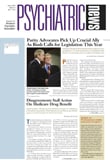Over the past year I have been fortunate, as your member-in-training trustee, to communicate to you through this column, and over two years as a trustee I have given a trainee’s view to the Board, other leaders in psychiatry, and the rest of medicine.
With the help of some hardworking colleagues, we addressed resident work hours and labor issues, advocated for programs facing closure, and addressed the structure of resident governance in APA. We created a section for trainees in Psychiatric Services and held a first-ever Residents’ Town Meeting, and I have served on the Board’s Work Plan Task Force and the Task Force on Ethics Regulation and Education.
Recently, your two trustees and other resident leaders presented to the Board a detailed report of ideas about resident-related membership issues.
Yet it has been a difficult period for APA and psychiatry. We have spent valuable resources trying to defeat a zealous psychologist-prescribing lobby and fighting lawsuits charging APA with conspiring with a pharmaceutical company .
As I depart the Board this month, I want to share two observations.
In these troubled times, we must ask ourselves: What is the purpose of APA? It is an important question because some leaders feel that a professional organization has a mandate to provide special resources for every subgroup that asks, and this can become contentious at a time when we must prioritize and contract our scope of activity.
The weapon these leaders sometimes use is the membership: “If APA cannot do action X for us in group Y, then they obviously don’t care about group Y; all those in group Y should quit APA, and future group Yers will not join.”
It is a sad situation when psychiatrists cannot see the forest through the trees and are willing to hold APA’s mission hostage to each subgroup’s wishes.
To me, such walkouts should be used when an organization acts in a manner offensive to the subgroup or has done something or stands for something intolerable to all of the would-be-departed. It should not be used when special programs, benefits, or deals are sacrificed in favor of more general, overarching priorities.
Unfortunately, I have observed this stance during debates not over general issues, but special issues: staff positions in favored departments, the existence of special components, etc. When those special contingencies are removed, it is in favor of the larger goals, those that furnish the greatest benefit to psychiatry in general.
And, in fact, APA has a set of strategic goals. The first is to “advocate for patients.” APA cannot be everything to everyone, but it must strive to be as much of an influence for psychiatry in general as it can. I would urge you to consider this as the component reorganization is realized and as more specialized activities are forsaken while we prioritize the bigger picture in the context of a shrinking budget.
It is disheartening to hear members threaten to quit APA because their group did not receive special treatment. Every member is important, every issue is important, starting first, in my mind, with the issues important to all psychiatrists, not those important to a few. We need to work together to help psychiatry and its voice—APA.
The second important issue is labor. Since the National Labor Relations Board deemed residents to be employees rather than students, there is increasing interest among residents in joining labor unions so they can engage in collective bargaining. Such unions would not be like the ones being sought by practicing physicians to deal with third party payers, but would be geared to permit collective bargaining between residents and hospitals, academic institutions, or other entities that sponsor graduate education. Thus, items up for bargaining might include educational activities rather than work conditions per se.
The ultimate tactic for a union is a strike—a work stoppage that would harm patients.
Unions should be taken seriously as powerful bargaining instruments. But who would make the decision to strike? Whose perspective would drive negotiations? I have great concern that bargaining about education would be driven by labor leaders more than physicians. Are labor leaders prepared to exert their power when patient care and physician education are at stake? My greatest concern is that labor issues, rather than educational issues, will predominate.
The alternatives are not to bar unions or ignore them. We should, instead, address the source of residents’ desire for unions: improved communication and responsiveness about conditions in which residents learn and care for patients.
This can be achieved through organizations that are not led by the labor movement, such as by a house-staff organization or the AMA’s Physicians for Responsible Negotiation, which eschews strikes as a tool.
One new idea, formulated at the Residents’ Town Meeting, would be to create a “hotline” for residents to call the Residency Review Committee (RRC) when they feel a program’s advertised educational program (periodically inspected by the RRC) is not what actually is in place.
In my perfect world, then, every psychiatrist would belong to APA, would be inherently flexible about its course, and residencies would be so copacetic that no one would have any complaints.
In the real world, I see training directors and department chairs who fail to teach one thing—that we are members of a larger profession. I know of department chairs who denigrate APA membership and of programs where psychiatric ethics are not taught.
Teachers of psychiatry: You have nothing to lose by promoting the profession, except its future.
As professionals, we are members of a larger group bonded by common education, values, and work. We constantly must bear in mind our common principles and advocate for them. My hope is that teachers today and tomorrow will continue to be examples of such advocacy.
As a profession, we are battling many forces. Perhaps it is all ultimately related to the bottom line. Recall that in the 1970s insurance companies called psychiatry a “bottomless pit” at a time when we had a fraction of the knowledge and a fraction of the therapeutic armamentarium that we do today.
We cannot pine for the circumstances of the past, but we must make sure that we attend to the important issues of today to return to the “former glory” of our profession. ▪

